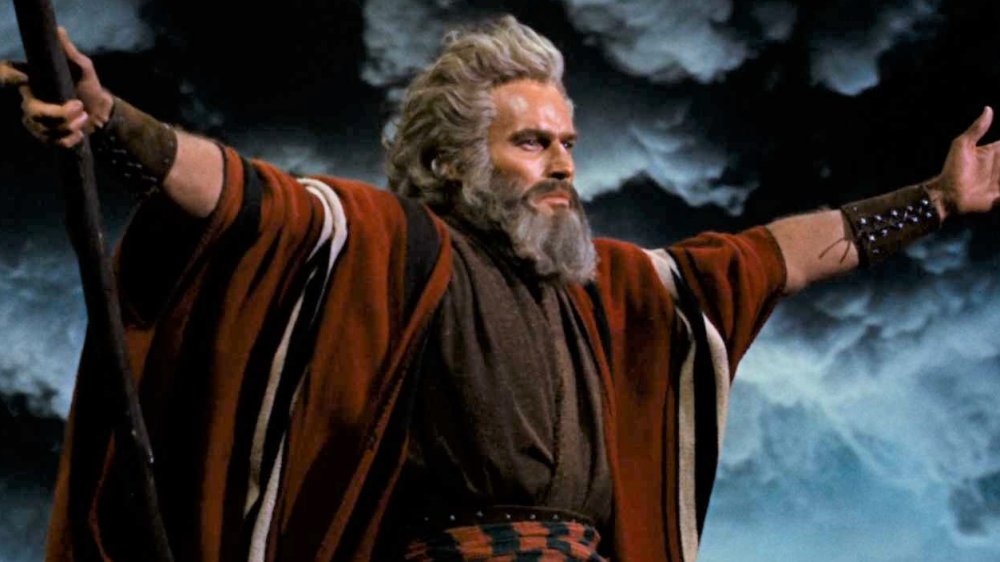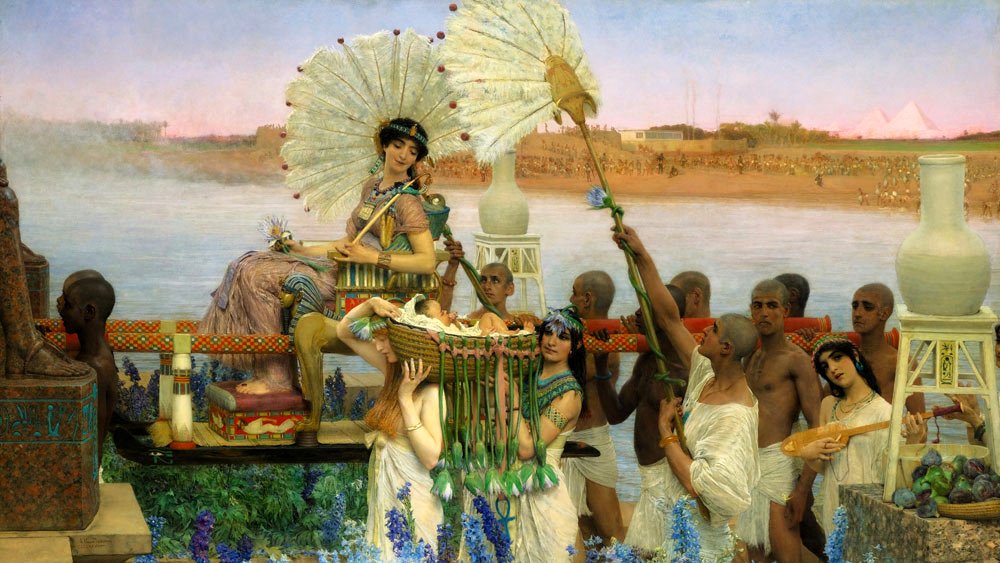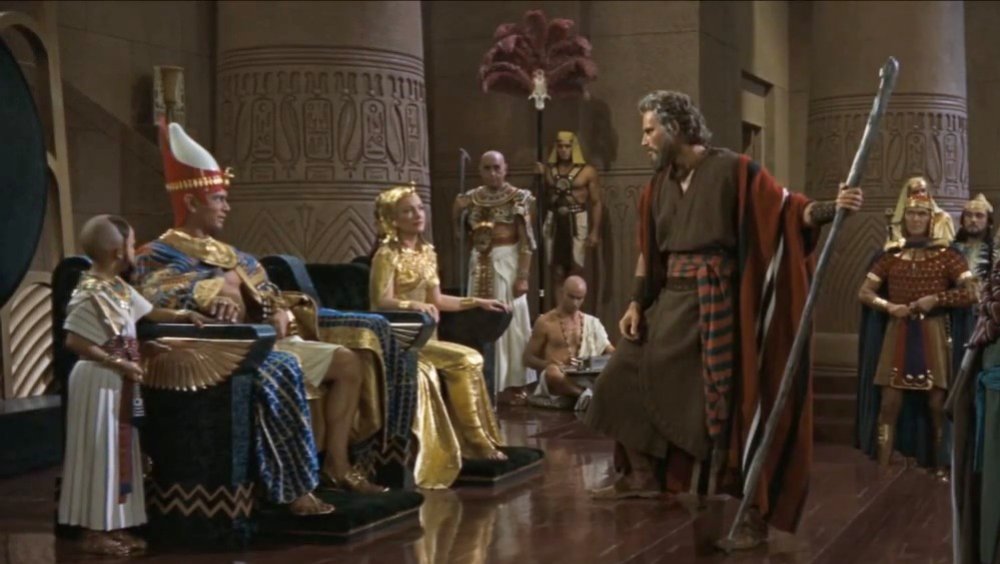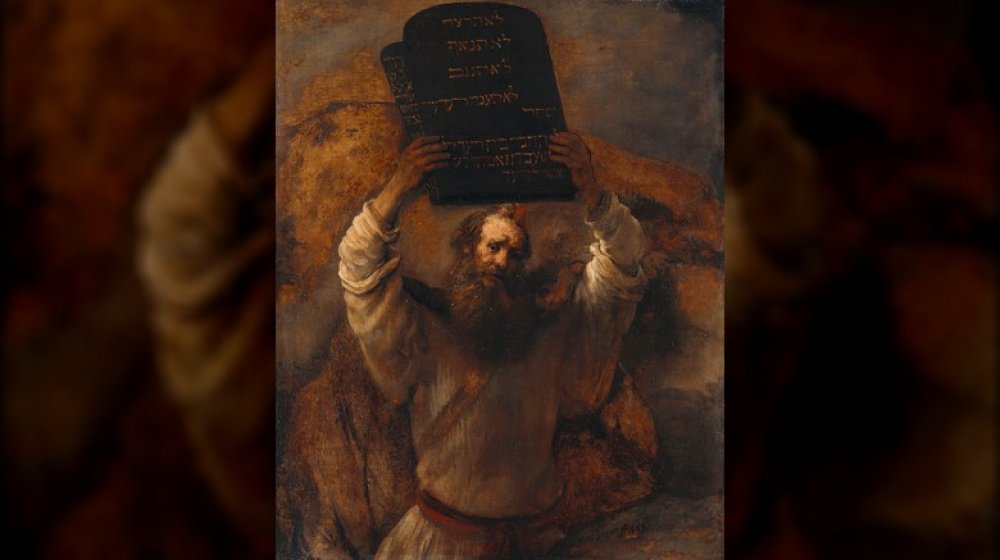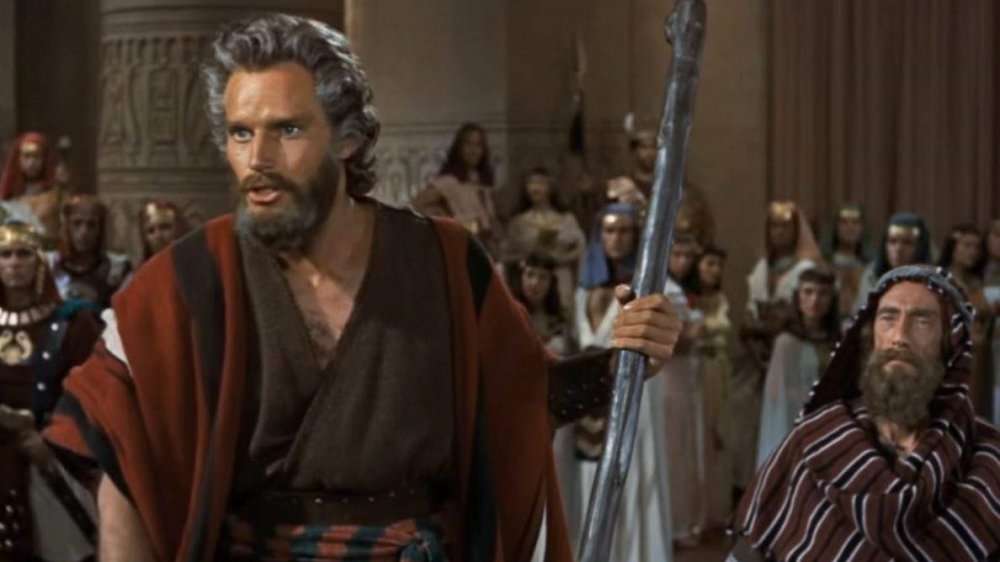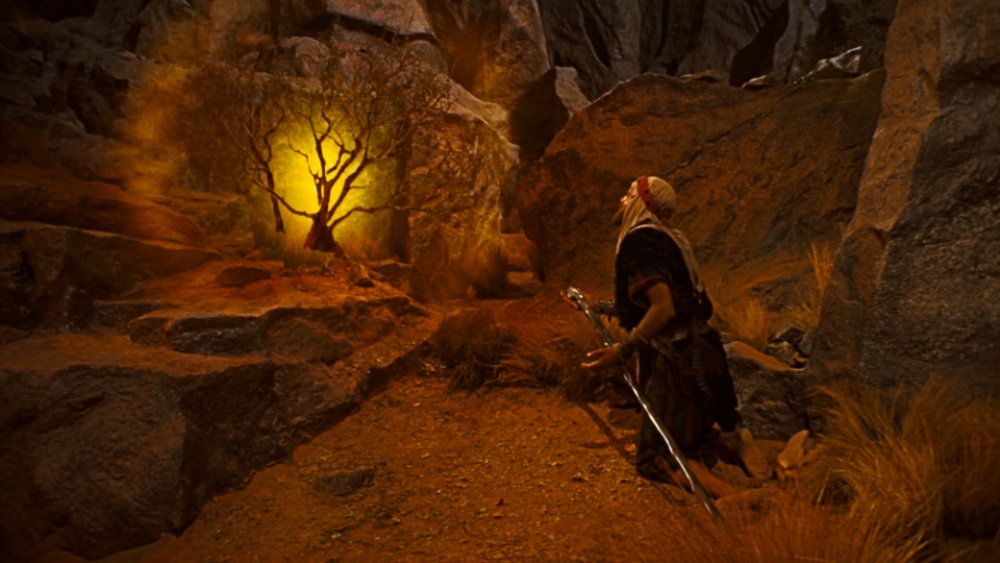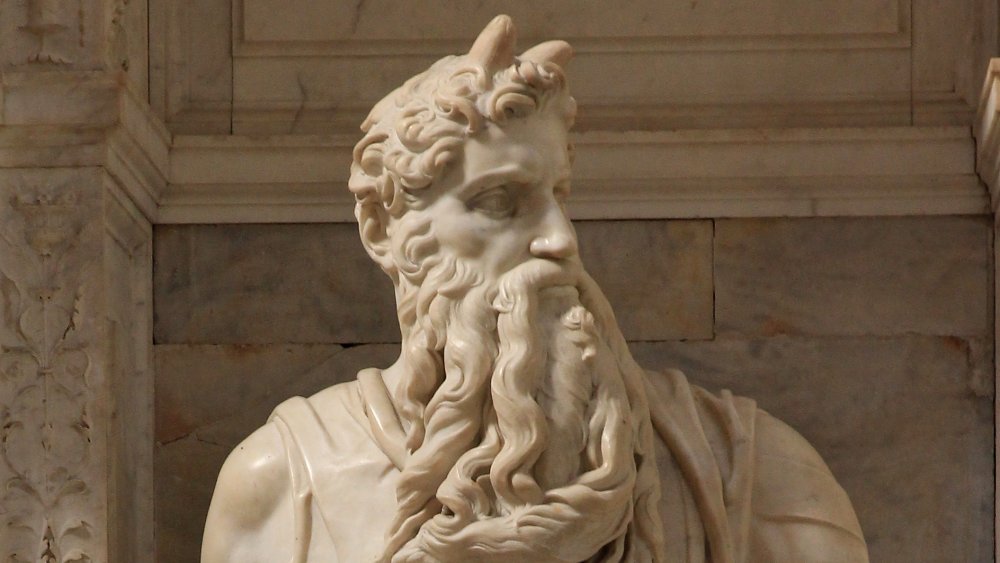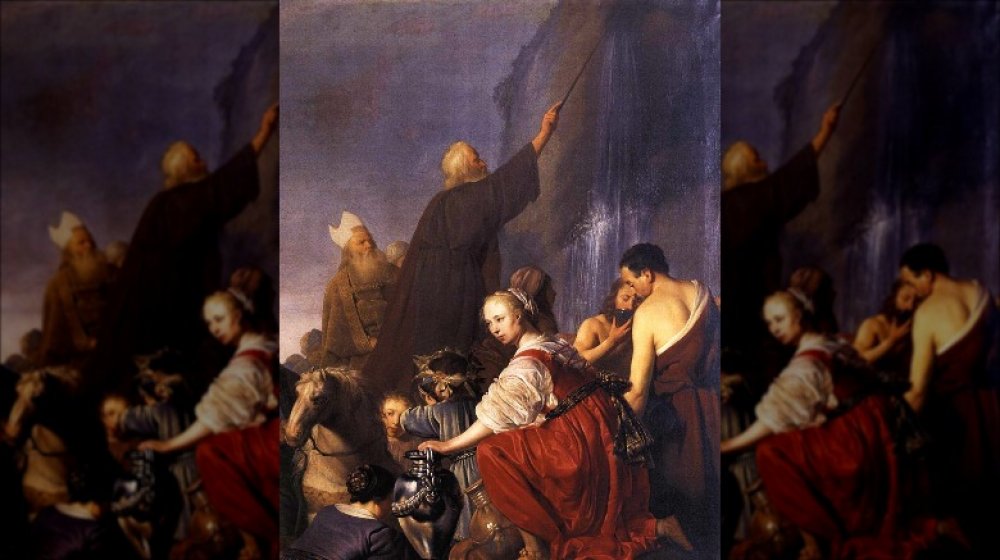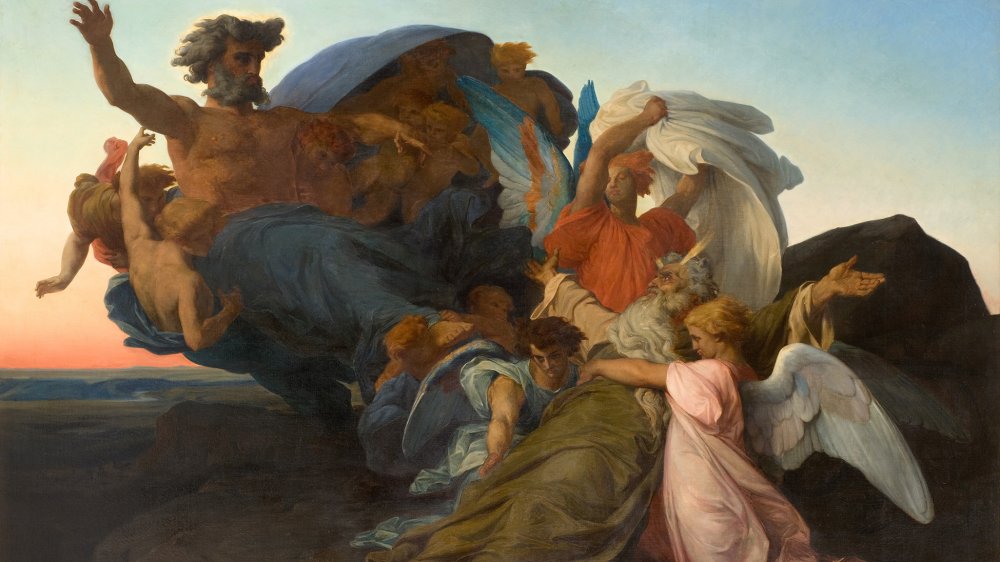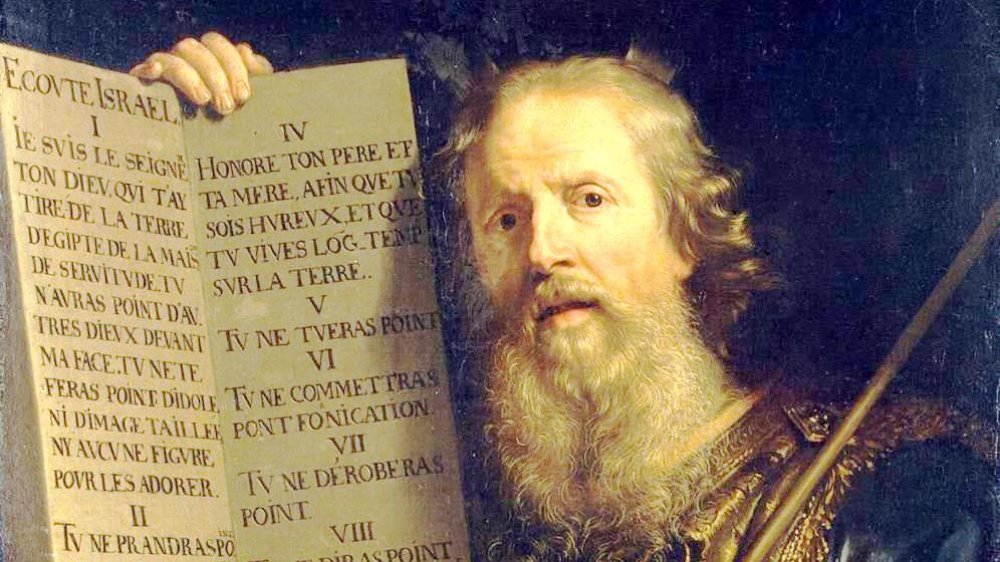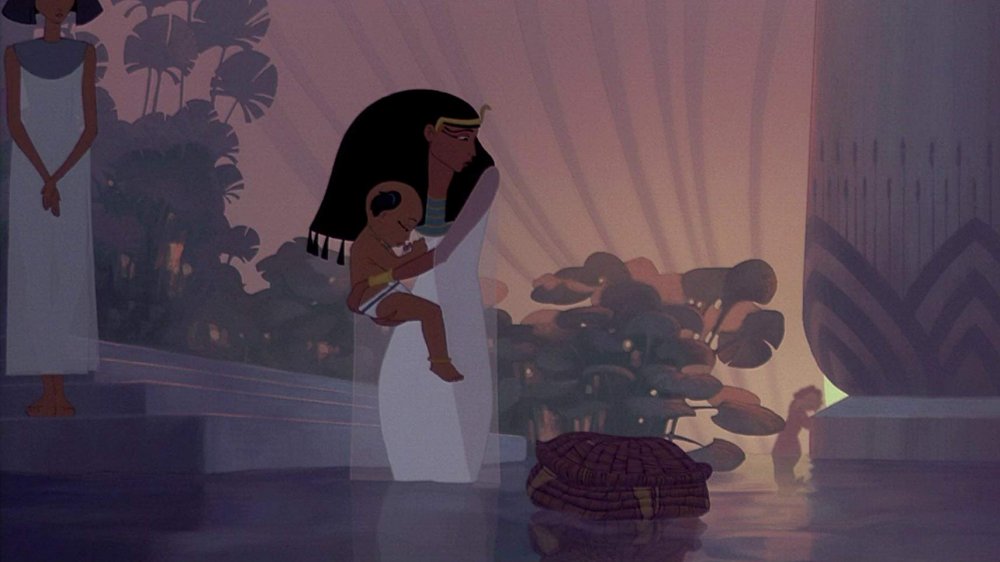The Untold Truth Of Moses
As major biblical figures go, it's pretty hard to top Moses in terms of importance and renown. Arguably the central protagonist of the first five books of the Bible (well, not counting Genesis), he's a major prophet, lawgiver, and liberator for the Jewish people, which makes him a towering presence in Judaism, Christianity, Islam, and many other religions. Even if you're not religious, multiple movies and other broad cultural associations mean you can probably bring to mind images of Moses parting the Red Sea, bringing the Ten Commandments down from the mountain, talking to a burning bush, or telling Pharaoh to let his people go.
But there's way, way more to Moses than even these tales, and a lot of it is incredibly strange. If all you know about God's number one boy is Prince of Egypt or Charlton Heston in a wig, here are some lesser-known facts about Moses.
Nobody knows what 'Moses' means
One of the most famous stories of Moses deals with his birth and how he escaped execution at the hands of a murder-happy Pharaoh trying to reduce the Jewish population in Egypt when his mom put the infant Moses in a basket floating down the Nile, where he was ironically rescued and subsequently raised by the Pharaoh's daughter. According to the book of Exodus, Pharaoh's daughter named him "Moses" from the Hebrew word mashah, meaning "to draw out," because she drew him out of the water. If your first instinct is to wonder why an Egyptian princess would give a mysterious river baby a Hebrew name, you're not alone. It doesn't make much sense.
Most modern scholars suggest that Moses' name is probably of Egyptian origin, but Exodus includes a folk etymology to downplay the Egyptian background of the Hebrew hero. While no definitive origin for the name Moses has ever been determined, the Online Etymology Dictionary suggests it comes from the Egyptian word mes, meaning "son of." The Jewish philosopher Philo of Alexandria connected it to the Egyptian word for water, mou. Rabbinical literature, which has an explanation for everything, suggests that the princess gave Moses a Hebrew name because she would've recognized the circumcised baby as a Hebrew. Others offer the explanation that Moses' own mother, whom the princess took on as a nurse, recommended the name to her.
Baby Moses snatched Pharaoh's crown
The canonical scriptures skip from Moses' infancy to his young adulthood, leaving a lot of gaps concerning his life at the Pharaoh's palace to be filled in by popular imagination. Fortunately for the curious, Jewish writers and rabbis of antiquity and the Middle Ages had exactly the same impulse to write fan fiction as modern day teens do. The Jewish Encyclopedia records one of the best-known legends of the child Moses, which involves him snatching Pharaoh's crown.
According to the legend, three-year-old Moses is sitting at the dinner table when he grabs the Pharaoh's crown and puts it on his own head. The Pharaoh's soothsayer worries this is a sign that the child is the prophesied future liberator of the Jews in Egypt. Fortunately for young Moses, one of Pharaoh's counselors is actually the angel Gabriel in disguise, looking out for God's favorite boy. The secret angel proposes a test to check the toddler's liberator status. He sets out a piece of gold and a live coal in front of Moses to see which one he grabs, with the understanding that a hero of destiny and greatness would surely grab the gold. To make sure that won't happen, Gabriel supernaturally guides the child's hand to the coal. Being a baby, Moses obviously puts the burning coal in his mouth. Pharaoh's mind is set at ease that a prophesied hero would never do anything that dumb, and Moses' life is saved.
Moses did a murder
If your familiarity with the life of Moses comes from children's Bibles or vague shadows of memory from Sunday school, you can probably remember such scenes as the baby in the basket and the parting of the Red Sea (a Bible mystery we've actually solved). What you may not remember, however, is that the inciting incident of Moses' role as prophet and deliverer of the people of Israel was a murder. Well, maybe a manslaughter. Arguably justifiable homicide. Anyway, he killed a dude.
In chapter two of Exodus, the young adult Moses witnesses an Egyptian overseer beating a Hebrew slave. Thinking no one can see him, Moses kills the Egyptian and buries his body in the sand. The movie Prince of Egypt makes this look like an accident, but it was definitely premeditated. Later on, when Moses tries to stop a fight between two Hebrews, one of them says, "Or what? You'll kill me like that one guy?" At that point, Moses knows the jig is up and books it out of Egypt and toward Midian, where he meets a girl and also a bush on fire that ends up being kind of important. Rabbinical literature, which never leaves a lily ungilded, confirms that Moses definitely didn't actually murder the Egyptian, because the overseer had forced an Israelite woman to commit adultery with him, the appropriate and legal punishment for which was death.
He might've had a stutter
In chapter four of Exodus, when the fugitive Moses encounters God in disguise as a shrubbery, he receives his call to action to become the great deliverer and lawgiver of the Israelite people. However, like any good Joseph Campbell-style hero, Moses tries to refuse this call, specifically citing that he's "heavy of mouth and heavy of tongue." Much debate has ensued about what this description literally means, but the traditional explanation is that Moses had a speech disorder, most often understood to be stuttering.
As Chabad.org explains, this stutter (also said to be a problem pronouncing "s sounds") was the result of baby Moses putting that coal in his mouth. But they also suggest that God specifically chose someone with a disability to be his spokesman so that all glory would go to God and not his human representative. Other explanations for Moses' heavy tongue include that maybe he just spoke slowly or in plain words. Sigmund Freud thought maybe the boy raised in Pharaoh's household couldn't speak Hebrew at all, while others theorize that he spoke with a heavy Egyptian accent (which would explain Moses' reference to having uncircumcised — i.e., non-Jewish — lips elsewhere in Exodus). The most popular explanation, however, remains that Moses had a stutter, with various other verses used to back this up. However, God helps Moses get over his hesitation by telling him his brother Aaron can do the actual talking part.
God tried to kill Moses for mysterious reasons
One of the strangest and most confusing incidents in the Bible occurs in chapter four of Exodus when Moses is on his way back from Midian to Egypt with his wife Zipporah and their son (or sons) in tow. While Moses and his family stop at an inn, God tries to kill Moses. Well, probably. These three bewildering verses contain what Daffy Duck would refer to as "pronoun trouble." Someone definitely tries to kill someone, and God as the former and Moses as the latter makes the most contextual sense.
Anyway, Zipporah stops God from killing her husband by cutting off their son's foreskin with a rock and throwing it at God's (probably, pronouns again) feet and then tossing out an amazing — if mystifying — one-liner: "Truly you are a bridegroom of blood." And, like, that's it. That's the story. What could this possibly mean? BibleStudy.org relates the traditional understanding that God was angry at Moses for not circumcising his son according to God's covenant with Israel. In this regard, Zipporah's quick and dirty bris saved Moses' life, but her bloody bridegroom quip is still hard to parse. Rabbinical literature makes the incident even more dramatic by making it Satan, not God, who comes to Moses on the road to Egypt, in the form of an enormous snake who swallows Moses headfirst down to the waist. Zipporah saves his lower half by rubbing circumcision blood on his feet.
A sibling rivalry
Moses is the most important prophet in Judaism, and as the person to whom the authorship of the Torah (the first five books of the Bible) is traditionally attributed, he's overall one of the most important dudes in all of the Bible. However, most modern biblical scholars say that the Torah wasn't actually written by Moses. In fact, they say it wasn't written by any one person. Instead, they say it's a composite of multiple documents that were edited together. And in the earliest of these documents, it seems like Moses' role was even more prominent and had to actually be toned down by communities who liked Moses' brother, Aaron, better.
According to the Encyclopedia Britannica, in the earliest sources for the Torah, Moses did everything, and the only mention of Aaron was when he built the golden calf for the Israelites, which wasn't exactly a high point for him. The reason for this seems to be that the earliest sources were written in the northern kingdom, where Moses was the biggest fish, while later documents from the south were written by Aaron fans, who made him Moses' helper and spokesman, as well as softening his culpability in the golden calf incident and generally adding "Aaron was also there" throughout the Torah. Aaron's main role in tradition is that of the first high priest, and so the passages of the Torah attributed to the priestly class account for some 90 percent of the references to Aaron in the Bible.
Moses saw God's butt
One of the things that most distinguishes Moses from other prophets is the personal nature of his relationship with God. In fact, the book of Deuteronomy says, "No prophet has arisen again in Israel like Moses, whom the Lord knew face to face." According to the book of Exodus, this isn't a metaphor. After Moses led the Israelites out of Egypt and brought them the law from Mount Sinai, he and God would just, like, hang out in Moses' tent and chat. Exodus chapter 33 says, "The Lord spoke to Moses face to face, just as a man speaks with his friend." It seems God was disguising himself in these instances, however, because Moses asks to see God's full glory. And even though God says no man can see God and live, he figures out a compromise for his best bro.
As Crossway explains, God agrees to reveal his full glory to Moses in order to encourage his leadership and as a reward for finding favor in his sight. But since the unvarnished image of God is deadly to the human mind, God says that Moses would have to stand in the corner facing the wall, and God would cover him with his hand until he had passed by, at which point Moses could turn around and look at God's back. You could say Moses hated to see God go but loved to watch him walk away.
He didn't have horns
According to Exodus chapter 34, Moses' constant close proximity to the face of God — from their tent hangouts to law-giving sessions on Mount Sinai — had an unintended consequence on the prophet. His face became so radiant that you might even say it glowed (like a light bulb). In fact, it glowed so much that Moses had to start wearing a veil because humans couldn't look him in the face. This change had an unintended consequence of its own, as it's made some people for hundreds of years think that Moses had horns.
As Haaretz explains, the Hebrew word for "ray of light" can also mean "horn," and so it's possible to interpret Moses' shiny face as a horned one if you take the less contextually appropriate translation. Unfortunately, this was the translation made by Saint Jerome when he translated the Bible into Latin, creating the version of the Bible used by European Christians until basically the Protestant Reformation. Probably the most notable consequence of this misunderstanding in culture is Michelangelo's famous sculpture of Moses in Rome's Basilica of Saint Peter in Chains, which prominently features two horns on Moses' brow, perplexing thousands of modern tourists daily. Strangely, some Jewish writers also believed Moses had horns. There's even a medieval Jewish poem in which Moses threatens to gore a host of angels. He was definitely meant to be shiny, though. Don't be weird about it.
He didn't make it to the Promised Land
Besides being a prophet and a lawgiver, one of Moses' most famous roles is as the liberator of the Jewish people, leading them out of Egypt, through 40 years of wandering the desert, and into a land of milk and honey promised to them by God. As such, it might surprise people not deeply familiar with the story of the Torah that Moses himself never actually made it to the Promised Land.
As the Jewish Encyclopedia explains, the walk from Egypt to Canaan is definitely not 40 years long. What happened is that when the Israelites got to the Promised Land, Moses' advance scouts reported that the land was full of giants, which made the people too scared to enter. For their lack of faith, God cursed them to wander until that entire generation had died in hopes that the next generation would be more faithful. Once that time had passed, however, Moses found out that God wasn't going to allow him to enter Canaan himself. Instead, he died on a mountain within eyeshot of the Promised Land at the age of 120, and God himself buried him in a mystery grave. The most common understanding of why Moses died just short of his goal is that in the book of Numbers, he hadn't shown proper confidence in God when Moses magically made water shoot out of a rock instead of trusting that God would provide.
Angels and demons fought over Moses' corpse
As pretty much the main dude of Judaism, naturally there's more apocryphal and folkloric content about Moses than most other prominent figures from the Hebrew scriptures. The incident of Moses' death is no exception to this trend, and the Jewish Encyclopedia records numerous legends about the death of Moses, including the idea that he actually faked his death because he was too modest to let people know that God had taken him directly into Heaven. Other stories have him juking the Angel of Death and remaining hidden by God until the world to come.
However, there is an apocryphal book that might shine a supernatural light on this mystery. The Assumption of Moses is a story so crazy that it didn't make it into the Bible. Nevertheless, there's a lost portion of this book that's so prominent that it's briefly referenced in the canonical New Testament Epistle of Jude. The story goes that God hid Moses' body so that the idol-prone Israelites wouldn't begin worshiping their leader's corpse the way they had the golden calf. Satan, on the other hand, thought this would be hilarious, so he tried to steal Moses' body. God, however, had placed the archangel Michael as the guardian of Moses' grave, and when the Devil tried to uncover the body, Michael rebuked him, forcing him to flee. Unfortunately, we only know of this story from others writing about it, as the only remaining portions of the Assumption are a dying Moses passing secret prophecies to his successor Joshua.
Did Moses invent the alphabet?
It's generally understood that the oldest alphabet we can verify the existence of is the Phoenician alphabet, used in the Iron Age to write Semitic languages but ultimately spreading across the Mediterranean and evolving into the Hebrew, Arabic, and Greek alphabets, as well as the one you're reading right now. For some Greco-Jewish historians, however, this explanation didn't hold water, and obviously Moses, in addition to his other accomplishments, invented the alphabet and then passed his version on to the Phoenicians.
According to the Jewish Virtual Library, a widely quoted fragment by the historian Eupolemus claims, "Moses was the first wise man, the first who imparted the alphabet to the Jews; the Phoenicians received it from the Jews, and the Greeks from the Phoenicians; also laws were first written by Moses for the Jews." Inventing the idea of letters is pretty big. Inventing the very concept of law is huge. That's like Dolly Parton writing "Jolene" and "I Will Always Love You" on the same day. The historian Artapanus went a step further, claiming Moses was the figure known to the Greeks as Musaeus, the teacher of the great musician Orpheus and the inventor of sailing, architecture, and philosophy. And, oh yeah, he was also the deity known to the Greeks as Hermes and the Egyptians as Thoth, the legendary figure who taught the alphabet, science, and mathematics to humankind. That's quite a claim, right there.
Moses wasn't the only mystery river baby
Despite Moses' role in the development of three different major world religions, most modern scholars generally reject his literal existence as a historical person, though many accept that the legend of Moses may be based on certain details from the life of a Moses-like historical person. One reason that Moses is considered to be more legend than fact is that some details of his life can be seen echoed in the stories of a number of other legendary or semi-legendary figures. The most prominent of these repeated motifs is the story of the baby Moses being rescued from the basket in the river.
According to the Ancient History Encyclopedia, Sargon of Akkad (the Mesopotamian king, not the internet racist) wrote a fiction-heavy autobiography in which he related that he was born the illegitimate child of a priestess who hid her crime by sealing baby Sargon in a basket that she sent down the Euphrates River, where he was rescued by a Sumerian gardener before rising through the ranks and becoming a conquering king. Likewise, the story of the Hindu hero Karna tells of a child born to an unmarried teen who hid her baby in a basket sent afloat on the Ganges, where he was rescued, adopted, and rose to greatness. Even the Greek story of Oedipus, which involves a baby left in the wilderness rather than a river, follows the same basic pattern.
